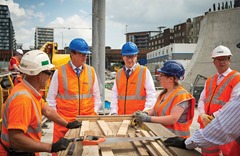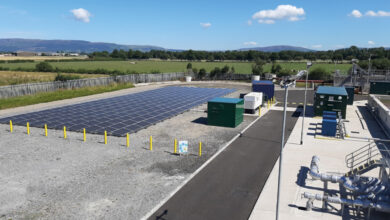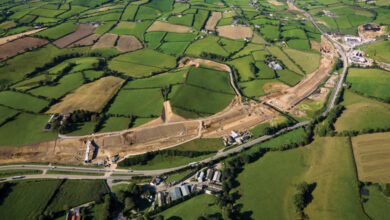Time to act on infrastructure
 The CBI is calling for difficult decisions to be made in order to meet the infrastructure needs of tomorrow.
The CBI is calling for difficult decisions to be made in order to meet the infrastructure needs of tomorrow.
The CBI regards infrastructure as being crucial to the UK’s economic and social fabric. However, the development of infrastructure, often inhibited by the need for significant finance and planning, has come to be associated with disruption and political intervention. Consequently, a CBI/URS infrastructure survey of 443 senior business leaders revealed that 96 per cent of businesses highlighted political uncertainty as a hindrance to investment, while 93 per cent identified political rhetoric as damaging to market confidence. This, it is argued, is stifling the UK economy and having an impact upon wider society.
‘Building trust’, another CBI report found that only 22 per cent of the public trust politicians to determine what infrastructure is required, while 64 per cent trust independent experts. Therefore, the CBI maintains that an independent infrastructure commission capable of identifying what infrastructure the UK requires, identifying stumbling blocks in advance and establishing public understanding, could rebuild confidence in investors. An integrated approach towards road, rail and aviation is also proposed to ensure that the UK’s infrastructure strategy is greater than the sum of its parts.
Currently, housing demand in the UK exceeds the stock built with only half the number of required homes built each year for the last decade. House prices have spiked by an average of 56 per cent in the same period and the average age of a first-time buyer (not in the receipt of family assistance) is 33 years. According to the CBI, this housing shortage incurs £4 billion a year in rising housing and transport costs from UK households.
Making a case for ambitious targets to tackle this problem, the CBI has stated that 240,000 homes should be built each year going forward. To achieve this there is a need to build on low quality greenbelt sites whilst also getting construction under way on at least 10 new garden cities by 2025. The CBI suggests that tough decisions need to be made in public spending. Rather than a superficial spend, the housing shortage needs to be tackled at its source. Therefore, the CBI has suggested that the Government rebalances part of the housing benefit bill towards increased capital investment in new social housing stock.
Simultaneously, the CBI has estimated that £100 billion of private sector investment is required by 2020 to decarbonise and diversify sources of energy production in the UK. The industry body is arguing for a focus on low margins between the need of extra capacity power stations and expected demand, as well as efforts to sustain manageable costs and rebuild trust in the market.
Most importantly, the CBI maintains that electricity market reform must be delivered in Great Britain in order to achieve investment and stability in the energy sector. Meanwhile, the Competition and Markets Authority’s review must be brought to a swift conclusion without political hindrance. Finally, the CBI regards a renewed emphasis on energy efficiency during the next Parliament as being vital in order to meet both energy security and affordability targets.
In relation to transport infrastructure, the CBI highlights the current pressures on the road and rail networks, as well as airport runway capacities. While conceding that positive developments are on the horizon, it contends that any tangible change will require swift decision-making and progress on the ground.
Overall, CBI Deputy Director General Katja Hall has asserted: “Progress on infrastructure has been a case of two steps forward and three steps back for far too long.” She added: “Politicians are too often seen ducking the big, politically difficult questions looming large on businesses’ risk register, like runway capacity and long-term road funding, rather than graspin





